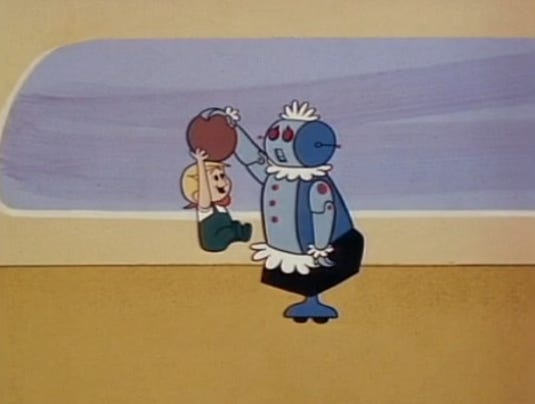
Will robots replace us in the labor market? With accelerating automation, it may sometimes seem that our jobs are doomed.
Robots deliver pizza. Google has developed cars that drive themselves. This is only the tip of an emerging iceberg.
Two years ago, Momentum Machines developed a robot that could provide freshly ground and grilled hamburgers to order, with freshly sliced vegetable toppings, and customized meat or seasoning combinations. If a customer wants a meat patty with one-third bison and two-thirds pork, the robot will provide it. And it can produce 360 custom burgers per hour.
A few years ago, the Los Angeles Times began using an artificial intelligence application to write weather and earthquake updates. Afterward, the AI app wrote sports articles. The newspaper tested the app by asking readers to compare articles written by the robot with articles written by human reporters. Very few could tell the difference.
If these examples aren’t daunting enough, some researchers believe that artificial intelligence, the internet of things, and virtual reality will make most human jobs obsolete within a decade or two. Robots, we are told, will handle so many of the tasks that now require human labor, very few jobs are likely to survive. Machines will be able to learn, and will constantly become more competent. Eventually, they will know so much that they won’t need human supervision. Some analysts argue that we’ll need a universal minimum income, so the hordes of displaced workers can survive.
These frightening prophecies, though, are out of touch with reality. We’ve been through technological revolutions before- and they’ve paved the way for more jobs, not fewer.
By inventing mechanical molds and the movable type press, Johannes Gutenberg drove thousands of European scribes out of their vocations. But his invention created new industries. It made the mass production of books and pamphlets possible, and without it the newspaper industry would never have existed. The movable type press killed thousands of jobs, and created millions more.
The automation of agriculture was even more disruptive to labor markets. In the nineteenth century, four out of five American jobs were on ranches or farms. Today, fewer than 3% are. Automated farming freed millions of people for other, less onerous work at higher wages.
We are at the verge of the next great leap in technology. It will, no doubt, destroy tens of millions of jobs. Some workers are likely to be displaced for months, some for years. Transitions to the new information-based economy are going to be difficult. For every job the robots destroy, though, they’ll create several more. A 2011 study by the International Federation of Robotics found that the use of one million industrial robots led directly to creation of three million jobs. Increased use of robots usually fosters lower unemployment
The jobs that survive the robot revolution are likely to be the ones requiring creativity, empathy and human connections, negotiation and persuasion- and repair and maintenance of robots. We are certain to see more job openings in science, technology, engineering, and math fields. As robots handle more of our repetitive tasks, we will have more opportunity for easier and more interesting work.
Welcome the robots. More than likely, they are your friends.
(To benefit from automation, you need current information. For this, a reliable internet connection is necessary. Talk to us. We can help.)

